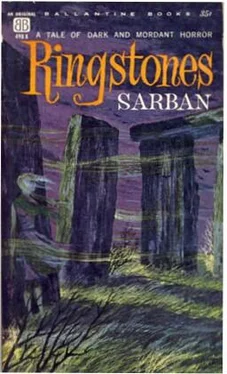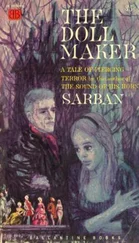Сарбан - Ringstones
Здесь есть возможность читать онлайн «Сарбан - Ringstones» весь текст электронной книги совершенно бесплатно (целиком полную версию без сокращений). В некоторых случаях можно слушать аудио, скачать через торрент в формате fb2 и присутствует краткое содержание. Жанр: Ужасы и Мистика, на английском языке. Описание произведения, (предисловие) а так же отзывы посетителей доступны на портале библиотеки ЛибКат.
- Название:Ringstones
- Автор:
- Жанр:
- Год:неизвестен
- ISBN:нет данных
- Рейтинг книги:3 / 5. Голосов: 1
-
Избранное:Добавить в избранное
- Отзывы:
-
Ваша оценка:
- 60
- 1
- 2
- 3
- 4
- 5
Ringstones: краткое содержание, описание и аннотация
Предлагаем к чтению аннотацию, описание, краткое содержание или предисловие (зависит от того, что написал сам автор книги «Ringstones»). Если вы не нашли необходимую информацию о книге — напишите в комментариях, мы постараемся отыскать её.
Ringstones — читать онлайн бесплатно полную книгу (весь текст) целиком
Ниже представлен текст книги, разбитый по страницам. Система сохранения места последней прочитанной страницы, позволяет с удобством читать онлайн бесплатно книгу «Ringstones», без необходимости каждый раз заново искать на чём Вы остановились. Поставьте закладку, и сможете в любой момент перейти на страницу, на которой закончили чтение.
Интервал:
Закладка:
We made straight for it, and soon we were sitting side by side on a large flat oblong stone lying within the circle. I pointed out the dip in the ridge which formed our Eastern horizon and remarked that Daphne's description was sufficiently accurate. Piers jumped up. “Yes,” I agreed, “this must be the Altar Stone itself. But I shouldn't have any scruples about resting your hinder end on it. The sheep seem to have treated it with less delicacy than old man what's−his−name.” I did my best to recall the description of the place in Daphne's story and, as I did so, recollected one particular that at once seemed to me to prove that she could not have seen the place with her own eyes. I mentioned it to Piers. But he thought I was referring to the clearing of the heather from the Stone Circle to the end of the Ringstones's private road. Of that, of course, there was no trace, and Piers began to explain again what he meant by imaginative and objective truth.
“No, no,” said I. “I'm thinking only of the grass here in the circle. Doesn't she write that it was smooth and close−cropped? Well, it's as rough and tussocky as any old bit of moorland. I should say she had the description of the place from the old fellow who told her what it was like when he was a boy, perhaps, when the place was kept tidy.”
Piers shook his head, and I don't know whether he thought my suggestion sensible or not. We strolled together to the edge of the circle on the side towards the hollow where Ringstones Hall ought to lie. From there you scarcely perceived that there was a valley between the moor where the Stone Circle stands and the hill beyond. I noticed the bridle road from Blagill across the moor to our right, and saw where it dipped out of sight in front of us.
We picked our way across from the Stone Circle by a very faint and uncertain path, turned down the bridle road, which showed very little sign of use, and then, quite suddenly, saw the hill fall away before us to a steep−sided little valley. It was a surprising view: a deep cup in the moor, green and wooded; an open space of park−land in the middle and, towards the South−Eastern side, a stone house and outbuildings. We stopped and looked down. There seemed to be no one about. The only moving things were some cattle in the park.
“Well,” I asked Piers, “what's your plan of campaign now we've got here?”
“Why,” said he, “what's wrong with ringing the bell and asking to see Miss Hazel?”
“Nowt. Nowt at all,” said I. “If we're lucky Dr Ravelin's old−world courtesy may extend to asking us to luncheon.”
“It can hardly not extend to asking us in to see a friend, anyway,” said Piers.
So down the hill we went. I quite forgot at the time to look out for the traces of Dr Ravelin's earthworks beside that rough, narrow lane. But as I remember the hillside now, so rough, so overgrown with bracken, ling and scrubby little thorn bushes and tufts of young birches, I doubt whether I could have succeeded in seeing any prehistoric embankment there though I had remembered and searched and stared all day. As we approached the level ground of the park it became obvious that Daphne Hazel had exercised to the full the artist's privilege of improving on nature. Like any new recruit to an order, perhaps, she had been quicker to learn its privileges than its duties. In the first place, the park was a good deal smaller than her story had led me to imagine; secondly, it was nothing like so trim and cared−for as I had pictured it. In fact, it was a sadly neglected little wilderness. Half the great trees were down, the shrubberies were scrub, the open lawns untended, rough with weeds and rushes and poached by the hooves of the red bullocks that turned their heads to follow us with slow stares as we passed. Near the bottom of the hill a tumbledown stone dyke which had once, no doubt, been the park boundary wall was sketchily mended with posts and wire, which were also strung across the road to keep the cattle from straying. We straddled over and went across the park proper towards the house. Half−way across we set up a covey of partridges from the rough grass by the side of the drive.
Once down the hill you cannot see the Hall itself until you are almost upon it, the trees having been so planted and the drive so windingly traced as to give the impression that the park is bigger than it really is. Neither of us spoke as we drew near it. We were both busy looking about us, and I, for one, was busy also adjusting my mind to the new situation, both curious and comic, which dawning suspicions, derived from the observations I had already made about the place, told me we were going to meet in a few minutes. I don't know what Piers was thinking just then. From the intentness of his expression he might have been expecting Daphne Hazel to burst from the bushes at any moment with all the hounds of Elf−land in pursuit.
Then we came out, round a belt of beech trees, and stood before the terrace of the Hall. We stood there quite a long time. The first glance at the Hall was enough, but I continued looking at it because I dared not look at Piers. When at length I did, I had to sit down on the stump of a tree and let my sense of humour have its way. I've never seen such a picture of crestfallen bewilderment as he presented. But he saw the funny side of it himself after a while and sat down beside me and laughed.
It was Ringstones Hall, all right: I hadn't the slightest doubt about that. But the place hadn't been lived in for a generation. The chimney−pots were gone, many a slab had slid from the roof and the shutters hung rotting from their hinges in front of the windows; grass and weeds grew in the cracks of the steps and tall red docks lifted their heads as high as the ground−floor windowsills. The house was not quite a ruin, but it was in the last stage of dilapidation and decay; deserted, mournful, pitiful as only an abandoned house can look.
We went up the steps and across the terrace. The front door was half−open; it had sagged on its hinges and, by the accumulation of soil at its foot, many a long year had passed since it was last shut. We went inside, into a stone−flagged hall, and looked about us. Our entry disturbed a number of jackdaws in the upper storey and their loud alarm cries echoed hollowly through the house. We heard them fluttering and scrabbling about the roof and setting up an indignant clamour as they wheeled about the place outside. The entrance hall smelt of damp and mould. From the marks on the walls it looked as if they had once been panelled; now they were stripped and the bare stone was streaked by weather. Only the lowest stair remained. All the others, with supports and balusters too, had been ripped out, and the landing that hung inaccessible above was devoid of woodwork. We wandered into the other ground−floor rooms. All were alike, stripped and empty; doors, panelling, almost every scrap of woodwork gone; the plaster had fallen from the ceilings and the fireplaces were choked with twigs and rubbish.
It had been a good old house. We admired it even in its decay: a well−built place with room to move about With a little imaginative reconstruction you could see it as it might have been a century ago: a sober, dignified, solid place wearing an air of having been there a long, long time.
“Well, well, well,” said Piers slowly when we came out on to the terrace again. “Let's go and have a look at the stables.”
We went round the end of the house and pushed our way between two broad, high yew hedges which had once bounded a short drive but now nearly blocked it; then down a flagged path, all but grassed over, to a square of buildings in much the same state of neglect as the Hall. One side of the double carriage−gate was missing. We went through into the yard. Every flag of the pavement was outlined by a little hedge of grass and weeds and the stones themselves were green with moss. Piers walked over to a stone trough that stood in the middle of the yard. Beside it leaned an iron pump, red with rust. The spout of the pump was missing; the handle lay on the flags. It ended, I observed, in some sort of scroll ornament, half rusted away.
Читать дальшеИнтервал:
Закладка:
Похожие книги на «Ringstones»
Представляем Вашему вниманию похожие книги на «Ringstones» списком для выбора. Мы отобрали схожую по названию и смыслу литературу в надежде предоставить читателям больше вариантов отыскать новые, интересные, ещё непрочитанные произведения.
Обсуждение, отзывы о книге «Ringstones» и просто собственные мнения читателей. Оставьте ваши комментарии, напишите, что Вы думаете о произведении, его смысле или главных героях. Укажите что конкретно понравилось, а что нет, и почему Вы так считаете.



